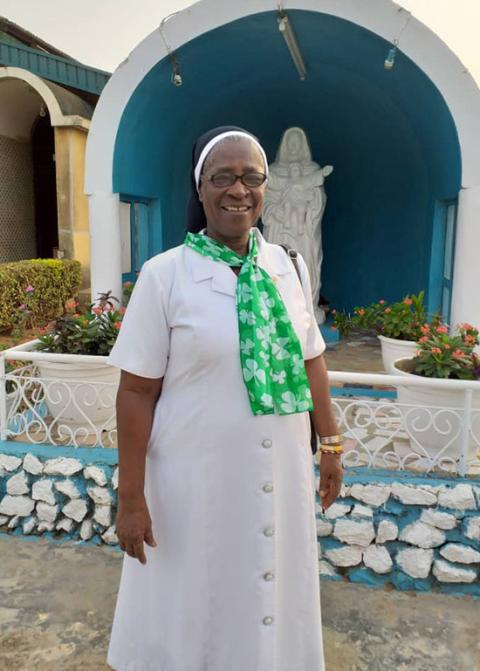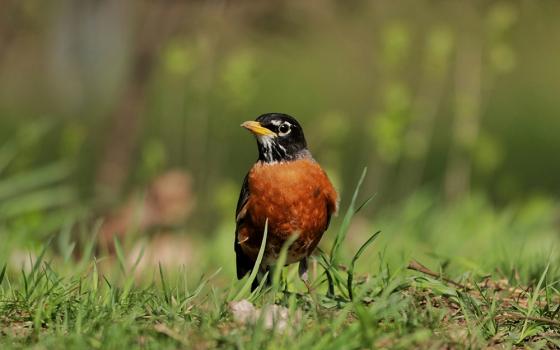
A school run by the Sisters of Notre Dame de Namur closed March 23 as a precaution to protect the children from the coronavirus outbreak. (Patrick Egwu)
When Sr. Veritas Onyemelukwe wakes up in the morning, the first thing she does is check her WhatsApp messages to see new information and trends about the coronavirus outbreak. In a closed WhatsApp forum created by the Nigerian sisters, health experts among them share the latest information about the global pandemic to help them make better decisions.
Onyemelukwe, who alongside two other sisters of her congregation runs a charity home for more than 50 homeless and abandoned children, said the information from the WhatsApp forum about the virus and how it spreads helps them educate the children in the home on safety precautions.
"It is not easy to control children and what they do," Onyemelukwe, a member of the Daughters of Divine Love of Enugu in southeast Nigeria, told Global Sisters Report. "They move around all the time and meet other children when they go to school, so the whole burden now rests with those taking care of them to take necessary steps to educate them in a way they can understand."

Sr. Veritas Onyemelukwe says she receives vital information on the coronavirus from a WhatsApp group operated by the Daughters of Divine Love. (Patrick Egwu)
Nigeria's first case of COVID-19 was reported Feb. 27. An Italian who had flown in from Milan tested positive in Lagos when he developed symptoms. More than one week later, another case was reported of a Nigerian man who had come in contact with the Italian when he arrived the country. The figure is increasing by the day, with new reported cases presently standing at 65 and one death as of March 26, according to Nigeria Centre for Disease Control.
In February, during a day of prayer the Daughters of Divine Love organized for all sisters in the country, the coronavirus pandemic was discussed, and some of the sisters who work at a diocesan hospital did a presentation on how the virus can be transmitted and safety measures to adopt.
"We also listen to the news, follow the trends and statistics about what is happening around the world and how people are responding to it," she said. "After that, we [sisters] come together to discuss and share ideas on how to implement the safety measures we have received and learned from health experts."
Creating awareness on the pandemic
The children in the Daughters of Divine Love's home attend a school run by sisters from the congregation. But in Enugu state, where the Daughters of Divine Love's charity home is based, the state government announced it was shutting down schools effective March 27 to help prevent an outbreak in the state, which has not yet recorded any cases.
Before the shutdown, the school provided a bucket of clean water and hand sanitizer for students to wash their hands at intervals. Sr. Kate Ikenga, the school's principal, called the children in a room to educate them and provide information about the virus and what they need to do to avoid being infected.
"Whenever I visit, I see her teaching them what to do in a language they will understand," Onyemelukwe said.

The Daughters of Divine Love watch the news and monitor trends on the coronavirus before making decisions. (Patrick Egwu)
When the children returned from school at around 1:30 p.m., they washed their hands in a bucket of water and soap in front of the gate at the home before going inside the house to pull off their clothes and have lunch.
"We help them maintain good hygiene and try to tell them to cover their mouth whenever they want to cough or sneeze because if one of them is infected, then all of them will get it," she said.
At the home, the sisters and other auxiliary staff help wash the children's clothes and clean the home with disinfectants.
"We bought medicine supplies like syrups, Vitamin C and antibiotics for the clinic in the home so that the nurse who works there can respond to their health challenges should anything happen," Onyemelukwe said.

Sr. Patricia Ebegbulem of Sisters of St. Louis says she provided hand sanitizer to victims of trafficking in the shelter she runs. (Patrick Egwu)
In other congregations, sisters take proactive action
Sr. Patricia Ebegbulem of the Sisters of St. Louis runs a shelter for victims of trafficking in Nigeria. When Nigeria's first case of coronavirus was reported, Ebegbulem and three other sisters at the shelter swung into action. They bought hand sanitizer for the shelter, which has 11 trafficking victims and four babies.
"We distributed it to them and gave them safety tips and how to be safe whenever they go out," Ebegbulem said. "We tell them to maintain some distance from each other and keep their rooms and cooking utensils clean at all times. We want them know the gravity of the pandemic so that when they go to work, they would be very careful."
On March 21, St. Ferdinand's Catholic Church in Lagos, where Ebegbulem's shelter is located, organized a sensitization and awareness meeting for more than 50 parishioners and members of the community. Ebegbulem and other sisters who work at the shelter attended. Fr. Francis Anyanwu, the parish priest, presided at the meeting and educated the attendees on what they need to do amid the growing cases of the virus in the county.
"The advice is that people should maintain some distance from one another and observe some hand-washing and other measures to avoid contracting the virus," she said. "We help during Mass at the parish, and that was why we attended, to know how to respond to this."
The Archdiocese of Lagos has imposed some restrictions on Mass, which the archbishop, Alfred Adewale Martins, said in a statement from the archdiocese are "proactive ecclesiastical steps we needed to take as an archdiocese to combat the spread of the virus."
The St. Louis sisters also run a parish-owned primary school. At the school, water and a bucket had been provided for the pupils to wash their hands regularly. The sister who works there gave the pupils tips to ensure they would stay safe from the virus.
But the children have stopped going to school, as the state government suspended all public and private schools in the state on March 23 for one month as part of wide range of measures to contain the growing cases of the coronavirus in the country. Places of worship and public gatherings of more than 20 were also banned as the government asks people to observe social distancing while deploying the police to enforce this directive.
"We have also stopped accepting victims of trafficking into the shelter, especially those who were sent in from abroad," Ebegbulem said.
Advertisement
Like the Daughters of Divine Love, the Sisters of Notre Dame de Namur in Nigeria use WhatsApp for information about the coronavirus. A WhatsApp group created by the sisters some years ago for easy communication about their ministry has turned into a go-to resource for news, data and tips on how to respond to the outbreak in their various ministries.
"Our sisters have a WhatsApp group where they share information on the outbreak," said Sr. Eucharia Madueke, who follows the conversation and also offers tips to the group from her base in the United States. "Those who have health backgrounds among us help in debunking myths about the virus because some of the information in the public space are false."
When Pope Francis called for prayers against the global pandemic, Madueke said the sisters resorted to saying their rosaries to ask for God's help and intercession.
"Some of them are posting about intercessory prayers that we need to make," she said.
Onyemelukwe told GSR that the children at the sisters' charity home are better informed now about the virus and what to do to protect themselves.
"Each of them now is conscious of the outbreak, and they do these things by themselves. When they come back from school, without even being told, they would go and wash their hands with water and soap before entering the home."
[Patrick Egwu is a freelance journalist based in Nigeria.]





